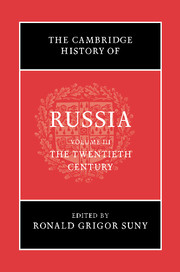Book contents
- Frontmatter
- Introduction
- 1 Reading Russia and the Soviet Union in the twentieth century: how the ‘West’ wrote its history of the USSR
- Part I Russia and the Soviet Union: The Story through Time
- Part II Russia and the Soviet Union: Themes and Trends
- 14 Economic and demographic change: Russia’s age of economic extremes
- 15 Transforming peasants in the twentieth century: dilemmas of Russian, Soviet and post-Soviet development
- 16 Workers and industrialization
- 17 Women and the state
- 18 Non-Russians in the Soviet Union and after
- 19 The western republics: Ukraine, Belarus, Moldova and the Baltics
- 20 Science, technology and modernity
- 21 Culture, 1900–1945
- 22 The politics of culture, 1945–2000
- 23 Comintern and Soviet foreign policy, 1919–1941
- 24 Moscow’s foreign policy, 1945–2000: identities, institutions and interests
- 25 The Soviet Union and the road to communism
- Bibliography
- Index
- References
15 - Transforming peasants in the twentieth century: dilemmas of Russian, Soviet and post-Soviet development
from Part II - Russia and the Soviet Union: Themes and Trends
Published online by Cambridge University Press: 28 March 2008
- Frontmatter
- Introduction
- 1 Reading Russia and the Soviet Union in the twentieth century: how the ‘West’ wrote its history of the USSR
- Part I Russia and the Soviet Union: The Story through Time
- Part II Russia and the Soviet Union: Themes and Trends
- 14 Economic and demographic change: Russia’s age of economic extremes
- 15 Transforming peasants in the twentieth century: dilemmas of Russian, Soviet and post-Soviet development
- 16 Workers and industrialization
- 17 Women and the state
- 18 Non-Russians in the Soviet Union and after
- 19 The western republics: Ukraine, Belarus, Moldova and the Baltics
- 20 Science, technology and modernity
- 21 Culture, 1900–1945
- 22 The politics of culture, 1945–2000
- 23 Comintern and Soviet foreign policy, 1919–1941
- 24 Moscow’s foreign policy, 1945–2000: identities, institutions and interests
- 25 The Soviet Union and the road to communism
- Bibliography
- Index
- References
Summary
Contexts for change
By the dawn of the twentieth century, most predominantly peasant societies were already colonised or otherwise subjugated by the world’s industrialised modern empires. For nations not yet subjected to the full force of this process, the penalties of backwardness were increasingly manifest. In Imperial Russia and the Soviet Union, the fear that backwardness might invite foreign conquest led a succession of heads of state to target peasants as producers of the grain needed to finance ambitious, government-sponsored projects for industrialisation. However, although peasants were crucial to the success of any development scenario, both reforming and revolutionary elites tended to discount the possibility of peasant agency. Peasants typically viewed as ‘raw material’ rather than as co-participants in the development process were – in the words of Caroline Humphrey – ‘never in possession of the master narrative of which they were the objects, and had no access to the sources from which it was reaching them’. The following discussion is intended to situate the peasant majority of the population as both agents and victims within the history of Imperial Russia and the Soviet Union, and to locate them on the shifting terrain of the post-Soviet era.
Keywords
- Type
- Chapter
- Information
- The Cambridge History of Russia , pp. 411 - 439Publisher: Cambridge University PressPrint publication year: 2006
References
- 1
- Cited by



